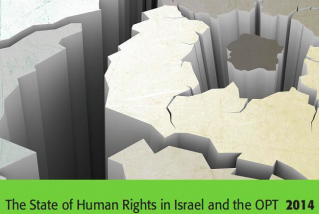
The annual State of Human Rights Report is published by the Association for Civil Rights in Israel (ACRI) each year to coincide with International Human Rights Day (December 10). In the report, ACRI reviews the current situation of human rights over the past year in Israel and in the Occupied Territories, warns against particularly severe violations of human rights, notes improvements, and points to the major trends in the field of human rights.
Download ACRI’s 2013 Situation Report – English | Hebrew | Arabic.
A distinguishing feature of this year’s report is the impact of Operation Protective Edge on human rights inside Israel – even following the end of the fighting. Apart from the immediate implications of the conflict, that witnessed many casualties, in Israel and many more in Gaza, a concerning trend became evident wherein freedom of speech was regularly violated. This was particularly the case with regard to criticism of the military operation: police arrested some 1,500 demonstrators; city mayors attempted to prevent public protests; violent groups of nationalist thugs beat protesters; universities limited the freedom of speech of students and teachers; Arab employees were fired as a result of statements made about the conflict; and social media users attempted to “police” online discourse and sanction those whose comments deviated from the national consensus.
During Operation Protective Edge, there was a upturn in racism and violence directed towards Arab citizens, some backed even by national leaders, and since then, the level of tension between Israel’s Arabs and Jews has remained at an elevated level. In Jerusalem, it seemed that the level of tension and violence reached its peak during the summer of 2014, but the number of victims continues to climb, along with a rising number of complaints and evidence showing excessive police violence against East Jerusalem residents.
Operation Protective Edge additionally exposed the fact that socio-economic inequalities are also reflected in the right to security. Leaders of municipal authorities in the South were made to seek donations to finance protective shelters; Gush Katif evacuees, immigrants and other vulnerable population groups living in caravans were left without protection from the rockets; and foreign agricultural workers and Bedouin residents of the Negev were left entirely without protection. The compensation scheme for businesses and workers in the South has continued to drag on in a way that punishes the weakest sections of the population.
On a positive note, the impact of the social protests and civil society were felt this year in the government and the Knesset: the Alalouf Committee was assembled with the mandate of combating poverty, the German Committee investigated the future of the public healthcare system, the Water Authority and the Knesset worked to reduce instances of water disconnections owing to debt, affordable housing measures were added to government legislation, the Ministry of Interior acted to reduce the financial gaps between the rich and poor municipalities in the Negev, and transgender rights have gained increased recognition. While many of these measures are insufficient in meeting pressing social needs, they reflect the beginning of a paradigm shift in social and civil rights in Israel.
According to Sharon Abraham-Weiss, ACRI Executive Director: “Violent and racist trends and the weakening of freedom of speech has been enhanced as a result of Operation Protective Edge. The events of the summer revealed the difficulty Israeli society has in coping with a plurality of views and opinions, and showcased the existence of a nationalistic and ideological minority. This is a destructive trend for democracy and Israeli society.”
Documents
Situation Report 2014 (English, PDF)
Situation Report 2014 (English, word)
Situation Report 2014 (Hebrew)
Situation Report 2014 (Arabic)
For media enquiries contact:
Steven Beck (ACRI)
steven@acri.org.il
Phone: +972 73 705 0733







